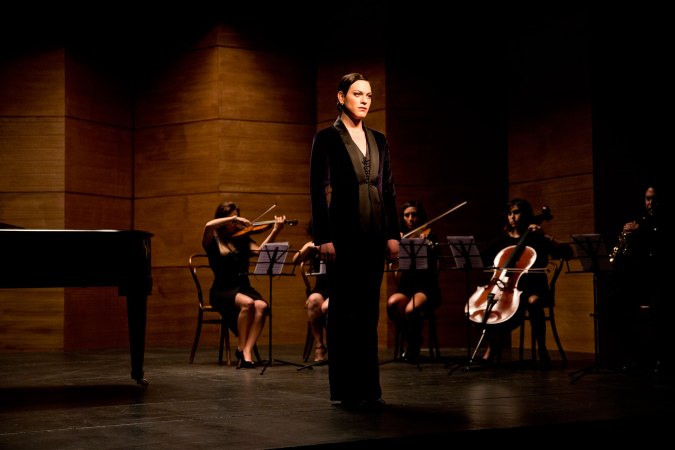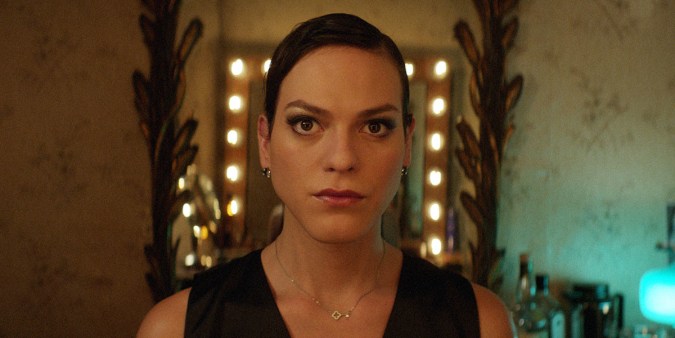Sebastian Lelio’s A Fantastic Woman is the second Chilean film to ever be nominated for the Academy Award for Best Foreign Language Film, a nomination that is even more historically significant given its fearless central performance by trans Chilean actress Daniela Vega. On its surface, the film tells the story of protagonist Marina, a trans singer who grieves following the unexpected death of her boyfriend, Orlando. But Vega, who won the FIPRESCI Prize for Best Actress at the Palm Springs Film Festival, explains that the story at the heart of A Fantastic Woman is a tad more complicated than this.
“In the end, it’s a character study that’s really about what it is we say when we talk about empathy and love,” she tells Remezcla. “It’s a film that asks, what type of bodies can move through the world and can be seen as worthy of love. It asks what loves and bodies can be claimed and dismissed.”
After Orlando’s death, Marina must go to the hospital where she deals with his family (an aggrieved ex-wife and a prejudiced adult son). We see that the world Marina and Orlando created for themselves is about to disappear. Marina has to give up her car, her apartment, and even has to deal with a police investigation that sees her not as the bereaved girlfriend but as a possible victim of sexual assault.
But even that description doesn’t get at the fantastical elements of the film, which borrows as much from Buster Keaton’s physical comedy and Busby Berkeley musical numbers as it does from Lelio’s previous film, Gloria. The Santiago you see on screen is both familiar and slightly off-kilter. Windy walks turn into gravity-defying tableaus and neon-lit bar sequences turn into full-on music videos.
Mere days before the film nabbed its well-earned Oscar nomination, Remezcla sat down with Vega to talk about her whirlwind year. Equally at home talking about trans advocacy as she is discussing how she became an actress, Vega (who’s also an accomplished lyrical singer, as evidenced by the closing scene of Lelio’s movie) is the kind of performer that is sure to make waves even after A Fantastic Woman stops wowing audiences in theaters. Check out some highlights from our chat below.
A Fantastic Woman opens in limited release on February 2, 2018.
On Being The First Trans Actress In Chile
I mean, I don’t want to presume. There may have been others before me, so I always opt instead to say that if I’m not the first, I’m at least, right now, the only one, la única. And that feels horrible. It embarrasses me. I don’t like being the only one in Chile doing this, because that means there aren’t policies of inclusion. The question that I ask myself is, how many trans people around the world are doing, making, things? How many of the journalists you work with are trans? How many of the government workers in, say, Colombia? Or in the Chilean government? How many trans pilots do we have? How many cops, judges, doctors, lawyers? Where are they? The question is open and yet the answer is very narrow. Just a few. Not enough. It could be that the world is ready to change and that newer generations are more open. But for now, the people who live in this world, who vote, who pay taxes, and who decide who rules the country they live in, are really not quite there yet, sadly.

On The Obstacles Trans People Face Every Day
To come to terms with being trans and going through with your transition can cost you a lot. Many people lose their families, their jobs. They have to restart their lives. And that’s terrifying. You can see the countries where gender identity is protected under law, the number of transitions doubles, or triples—the rates skyrocket! It’s not because suddenly this has become contagious or anything. It’s because people, feeling safe and having the necessary tools to continue living their life, are emboldened to take that leap. It’s one thing to just suffer the cost of losing your family—but when you risk losing that and your job and your friends and your livelihood, well, you can see why people would be scared to come forward. Some people just literally can’t afford to do that. I am very fortunate in that my own family was very supportive. And I was 14! This was 14 years ago. It was unthinkable. I couldn’t believe that my family was supporting me at such a young age. I was so grateful for having my family in my corner from day one. But there are people who don’t have that. And that’s horrible.
On Stumbling Onto Her Acting Career
Well, after transitioning, I realized that that wasn’t the only thing that I was here in the world for. Transitioning was part of a process. So I asked myself, what to do now? I wanted to go back to singing, which I’d left behind, but I didn’t really have enough money for lessons. Through someone I know, I was asked to be part of the make-up team for a theater production. And at that time I was a bit depressed so I took it just to get out of my head. I was just doing my job and one day I spoke up about someone’s performance. The director was like, if you think you can do it better, let’s see you do it. And I did! That’s how I stumbled onto all of this. Because this was at a university, so then for a year a half, I was basically sitting in on all these classes until I was offered a role by a director who’d been seeing me there. That’s when I started acting regularly on stage.
On Landing ‘A Fantastic Woman’
I first started working in film when a director came to see me at one of the plays I was performing in. He offered me what would be my first movie role [in La visita]. From then on, friends of mine who are musicians and artists, began asking me to take part in their music videos. That’s how I began to sort of train myself in front of the camera. With La visita, I started to travel a lot and that’s when The Fantastic Woman came to me. Everyone knows this story already: Sebastian first approached me to be a culture consultant on the film and then ended up offering me the role of Marina.

On How Closely She Resembles Marina
Actually, she’s completely different from me. She’s a character, first of all. She’s fantastic, I am not. Marina can fly and can do all sorts of things that I can’t. I give her my emotions. And my body, which is there to serve her. But beyond that, we’re very different people.
On Realizing ‘A Fantastic Woman’ Would Be A Hit
I’ll tell you when I knew: when we got a ten minute standing ovation at Berlin. I mean, a minute standing ovation? That’s good. Two, three, wow that’s great. But this was a full ten minutes of people applauding! That’s when I knew. It was a moment, like, wow—I felt like Maria Callas! Such thunderous applause for so long. I came out of the theater knowing that this was something else. You always hope you’ll make something that your family, your friends, your neighbors maybe, will go see. But this kind of explosive and worldwide reception? I didn’t expect that at all.
This interview was conducted in Spanish and translated by the author for Remezcla.




